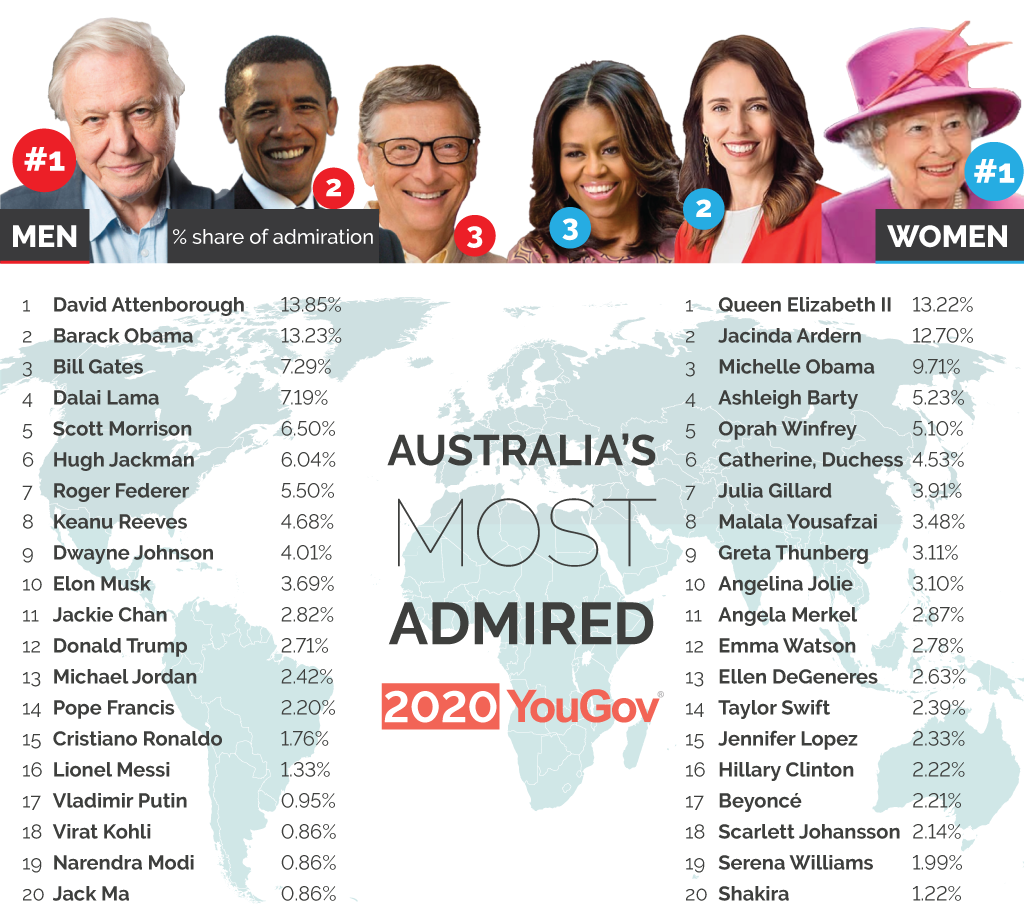David Attenborough and Queen Elizabeth II top the list for the second year running
Natural historian and broadcaster David Attenborough is Australia’s most admired man for the second year running, according to YouGov’s annual study of which public figures people look up to.
He is followed by former President of the United States Barack Obama in second place, who is this year’s most admired man in the world. Microsoft co-founder and billionaire philanthropist Bill Gates is in third, and the Dalai Lama is in fourth.
Prime Minister Scott Morrison comes in fifth place, appearing for the first time in the top ten, and is the only Australian in the top ten.
Celebrities feature prominently, with Hollywood actors Hugh Jackman, Keanu Reeves and Dwayne Johnson coming in sixth, eighth and ninth respectively.
The list of admired men is completed with professional tennis player Roger Federer in seventh, and CEO of SpaceX and Tesla Elon Musk in tenth.
Queen Elizabeth II has again topped the list as Australia’s most admired woman. Other world leaders also do well on the list. Prime Minister of New Zealand Jacinda Ardern comes in second place, former First Lady of the United States Michelle Obama in third, the Duchess of Cambridge Kate Middleton in sixth and Former Prime Minister Julia Gillard in seventh.
Newcomer to the list and professional tennis player Ashleigh Barty comes in fourth, and is the only other Australian in the top ten.
Activists fare well in the list. Pakistani activist for female education Malala Yosafzai appears in eighth place, and is followed closely by Swedish environmentalist Greta Thunberg in ninth.
The top ten is completed with entertainers like television talkshow host Oprah Winfrey in fifth, and Hollywood actress Angelina Jolie in tenth.
Methodology
From January to March this year YouGov gathered open-ended nominations from panellists across 42 countries and territories, asking them simply: “Thinking about people alive in the world today, which [man or woman] do you most admire?” These nominations were then used to compile a list of the 20 men and 20 women who received the most nominations and were nominated in at least four countries. An additional 5-10 popular local figures were added to the lists for individual countries.
Because the first wave of fieldwork was carried out before the peak of the coronavirus pandemic, some figures associated with leading national efforts to counter the disease did not make it on to the national admiration lists. This is unlikely to affect the global results, as such figures are generally only well-known in their own country and a candidate needs to be nominated in at least four countries to stand a chance of making the global top twenty (which it is less likely still they would have reached).
In fieldwork conducted from May to September we used these lists to poll each of the 42 areas asking two questions: “who do you truly admire?”, where respondents could make multiple selections, and “who do you MOST admire?”, where they could only pick one. These two numbers were combined into a percentage share of admiration, displayed to the right of each name in the graphic above and table below, which shows the full results for every country including local celebrities and public figures:
By asking respondents two questions, we can understand both the breadth (i.e. global reach) and the intensity of a person's support.
Altogether, we polled in countries that constitute more than seven-tenths of the world's population. However, some parts of the world were better represented than others, so we weighted up the impact certain countries had on the final scores and weighted down others so the global scores more accurately reflect the breakdown of sentiment in the world overall.
All of the surveys were conducted online, and in many of the countries the internet penetration is low to the point where the sample can only be said to be representative to the online population. The countries and territories where this applies are China (including Hong Kong), Egypt, Indonesia, Malaysia, Pakistan and the Philippines.









